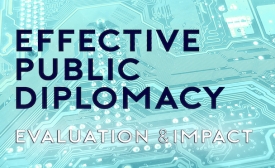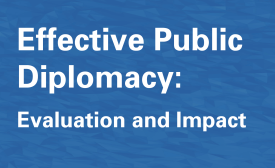public diplomacy evaluation
Recently, we analyzed the mediated public diplomacy efforts of Angola in the United States. To facilitate this analysis, we content analyzed American news coverage (by examining The Wall Street Journal and USA Today) from 2008 to 2015, as well as press releases from the Angolan embassy website, dating back to 2011. While the initial goal was to examine how CPD fellow Dr. Jami Fullerton’s Model of Country Concept might apply to a developing African nation, our findings also offered insights and suggestions for CPD’s research initiatives relating to Global Youth and Evaluation.

This unique three-day program equipped participants with working knowledge of research and analytical tools needed to develop and implement successful public diplomacy programs.
Public diplomacy (PD to its friends) is one of the less celebrated but more intriguing investments in U.S. foreign policy. For decades, it has earned lasting allies for our country and helped multitudes understand and embrace our core values, including human rights, freedom of information, strong civil society and education for all.

A diverse array of backgrounds represented at “Effective Public Diplomacy: Evaluation and Impact” 2015.
First, the shortcomings in "public diplomacy" and lack of transparency in the five-month-old Kurdish peace process have led to confusion and anger, especially among Turks. This sentiment has triggered street violence by small groups, but what is more important is that the "silent majority" feels deprived of adequate information about the process. Prime minister Recep Tayyip Erdogan grasped that.
Digital diplomats broadcast messages and multimedia, attract commenters to specially designed forums in foreign languages and monitor trending topics in an attempt to take the world’s pulse. But whether conducted online or off, public diplomacy has always been an inexact science. how do diplomats know whether their efforts are paying off?
Our public diplomacy was a failure. Public diplomacy is about winning hearts and minds and is therefore an important tool of diplomatic influence. SA's conviction that the AU roadmap is the best blueprint for engaging Libya, and Gaddafi, suffered at the hands of poor public diplomacy.







